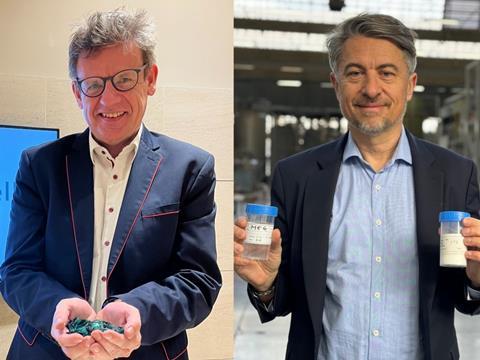
Carbios and Landbell Group have signed a non-binding Memorandum of Understanding for the sourcing, preparation, and recycling of post-consumer PET waste, with 15kT of flakes set to be supplied every year from 2026.
Reportedly, Carbios’ enzyme is highly selective and optimized for efficient PET degradation. It can process all types of PET waste, the company explains, including coloured, multilayer, or textile waste – all of which are currently incompatible with conventional processes.
Enzymatic PET recycling produces PTA and MEG, two monomers that can be used to rebuild PET. The result is thought to be suitable for food contact and equal to petro-sourced plastics in quality.
According to recent life cycle analyses, the process reduces CO2 emissions by 57% compared to virgin plastic production, and avoids 1.3 tons of oil for every tone of recycled PET produced. The Ellen MacArthur Foundation’s Material Circularity Indicator calculates that enzymatic recycling is five times more circular than conventional recycling processes.
It is also said to require less sorting and washing than current recycling technologies and is expected to save energy and water usage in the future.
Carbios’ plant is being built in Longlaville, France – a strategic location close to the Belgian, German, and Luxembourgish borders. Carbios expects to source 70% of the feedstock required for its plant to operate at a 50kT/year capacity from the CITEO tender in France and the resultant supply of multilayer trays; its Memorandum of Understanding with Indorama Ventures; and its new partnership with Landbell Group in Germany.
Landbell Group will provide its expertise and network to source PET packaging and textile waste for biorecycling. Its supply of PET flakes will be used as feedstock for Carbios’ production of food-grade PTA and MEG, which will then be re-polymerized further to produce PET.
The partnership anticipates that multilayered, coloured, and opaque PET trays that enter the waste stream, as well as polyester textile waste, will be recycled.
Emmanuel Ladent, CEO of Carbios, comments: “Through our new partnership with Landbell Group, Carbios secures a significant feedstock supply for our first commercial plant, and we are pleased to make biorecycled PET available to Landbell’s extensive client portfolio, powering a circular economy for plastic.
“Carbios’ innovative biorecycling technology enables the conversion of diverse wastes into valuable products, enhancing flexibility and competitiveness. By minimizing bottle usage and diversifying raw material sources, we’re advancing sustainability while meeting market demands effectively.
“Together, we’re forging a future where waste becomes a valuable resource.”
“PET trays are extensively used in food packaging due to their excellent barrier properties, transparency and strength,” continues Uwe Echteler, COO of Landbell Group. “However, PET trays, especially with a multi-layered structure, currently pose a challenge for mechanical recycling.
“The innovative depolymerization process developed by Carbios facilitates the recycling of PET waste into high-quality recycled PET. Landbell Group and Carbios together will enable closed-loop recycling of problematic PET waste to allow its customers – packaging manufacturers and brands – to use recycled content in food packaging and meet their sustainability targets.”
Carbios and Indorama Ventures shared their plans to construct a manufacturing plant for PET biorecycling in February 2022. A building permit and operating authorization were granted late last year.
De Smet Engineers & Contractors is also joining Carbios in an engineering partnership; its role will be to handle project management and detailed engineering, including procurement assistance and the management of Carbios’ partners.
In our latest edition of The Brief, we dig deeper into the biorecycling landscape – research and development, potential roadblocks, and how it could complement or detract from existing recycling technologies.
If you liked this story, you might also enjoy:
The Brief: How viable is biorecycling for plastics?
Report: How the top brands are progressing on packaging sustainability
The Brief: Using ocean-bound plastic in packaging – how, why and should we?













No comments yet